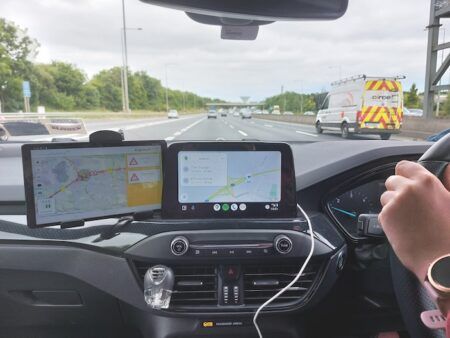The argument for public acceptance of road user charging, by Steven Norris
In recent years, the transportation industry has been placing much hope in the concept of pay-per-mile road user charging (RUC) as a means to address falling gas-tax revenues. In a world of fuel-efficient, and even all-electric, cars, a funding crisis looms.
Former UK transport minister and commissioner for the Independent Transport Commission Steven Norris (right) explains the pressing need to move toward per-mile road user charging in the UK – before it’s too late.
“In the past, universal road user charging existed only in the imaginations of technologists and was deeply anathema to politicians. But now even politicians will privately say, ‘We understand,’ even if publicly they say, ‘It’s absolutely not on the table.’
“Now we know that the cost of installing a road user charging (RUC) system is massively reduced than it was, but the benefits are enormous. In fact, the sooner we do it, the better we can capture whatever remaining of fuel duty there is.
“Why would we want to do this? Well, ironically it is because fuel duty doesn’t just pay for highway work or even transport. It pays for schools and hospitals and many other vital public services; it supports our armed forces. In fact, whatever your favorite branch of government, fuel duty is contributing to it.
“If we’re going to keep spending on the services that we believe are essential, then we have to find another way of raising the money. We could put an extra 6% on income tax, double the rate of corporation tax or add 10-15% to capital gains tax.
“Charging for road use may be unpopular, but these alternatives are even less popular. But what are the benefits? It would give us a system whereby we get the revenue that is fast disappearing. We would not only be able to capture that revenue and charge for the last great free utility – because that’s what roads currently are – but we will also be able to use all those behavioral elements of charging that can be so useful in managing a constrained system. For example, we could have a different rate to drive during peak hours than at other times and charge more to use roads through crowded town centers.
“Attempts have been made to introduce RUC in Manchester and Edinburgh, but I would make the point that in both cases they made the mistake of allowing people to vote on it – a desperately silly thing to do. Would a turkey ever vote for an early Christmas? In both projects people believed they would get the transport benefits without having to pay the congestion charge.
“What you have to do is be completely open about the economics. If you’re still buying fossil fuel, for every £100 (US$131) you currently spend in the UK, £60 (US$78) is duty or tax in one form or another. Alternatively you’ll be paying X pence per mile, which will be the price of RUC.
“The only way to persuade people that road pricing is not just another way for the government to stick its hand in your pocket is to be completely transparent with the public about why the change is needed, what is being done to effect the change and what the less attractive alternatives are then finally how the vast majority of motorists won’t pay more, they will just pay in a different way.
“By committing to show how the average motorist will simply not pay any more and can, if they respond to the behavioral nudges, pay less, then you will actually bring the public with you. “
The arguement against public acceptance of road user charging by Bern Grush
Although there are plenty of RUC pilots being conducted around the world, Bern Grush, (right) a founder of transportation consultants Grush Niles, and former Traffic Technology International columnist, believes that selling the concept to the public may be more difficult than optimists would have us believe.
“Public acceptance of road pricing is fraught with misunderstanding,” he says. “There is a sense of unfairness. People don’t want to pay for something they previously perceived as being free. It can sound like a tax grab. They might understand congestion pricing in a bounded area, but road pricing everywhere is different. There are lots of roads that are empty. There are lots of roads that are in a bad state of repair. Or they might argue the road was paid for long ago… there’s a whole list of reasons why people might not like it.”
On top of this Grush cites the rising cost of living and, fundamentally, resistance against pressure to drive less as the average driver’s key arguments against RUC. “People don’t want to drive less,” he says. “Our species has been used to powered mobility for a long time, ever since donkeys, camels and horses.
Those of us with more powered mobility got more of other things, too. We got more land and we got more women and we got more food and we killed more enemies, because we could move faster and better. So now people have cars, which enable them to move all the things they want, whenever they want, and RUC could be perceived as restricting this, because small charges add up to a large amount of money over time. So there are many reasons, imagined and real, that mean people will say ‘no’ to it. And there are also many reasons why they should say ‘yes’, but your average citizen doesn’t understand them. There’s so much feeling against road pricing that it’s not going to happen.”
However, Grush does see a solution to the crisis on the horizon – not through any smart education program about the benefits of RUC, but through the widespread adoption of autonomous vehicles. “The progress toward automated vehicles is going to be slower than we think, but that progress will also help to achieve progress toward road pricing.
“Let’s say that by 2030, 45% of the world’s population will have access to ‘robotaxis’. I hope by then I’ll be able to say that RUC got buried in robotaxi fees. When you use one of these cabs you’ll be expecting to pay a certain amount per mile. What I’m saying is that a couple of cents of that will have to be tax for road maintenance, and some will be profit. We only need a couple of cents for the roads. The company that’s running it will want profit anyway – 6 or 8 cents per mile.
“I’m a firm believer that while we’re in a democratic environment, where politicians can lose their jobs for promoting road pricing, we’re not going to have it. I’m absolutely convinced of that. But I’m hopeful that we will get it into autonomous vehicles.”
If we do eventually reach this road-pricing Utopia, what could it mean for traditional toll roads? Will they still be needed?
“Traditional tolls could survive if they reduce journey times,” says Grush. “But with the agony of stop-start driving gone – because the car handles that – some drivers might avoid toll roads altogether.”
Will the public accept road user charging? Have your say in our exclusive poll
Read the full versions of Norris’ and Grush’s opinions in the forthcoming 2018 edition of Tolltrans




